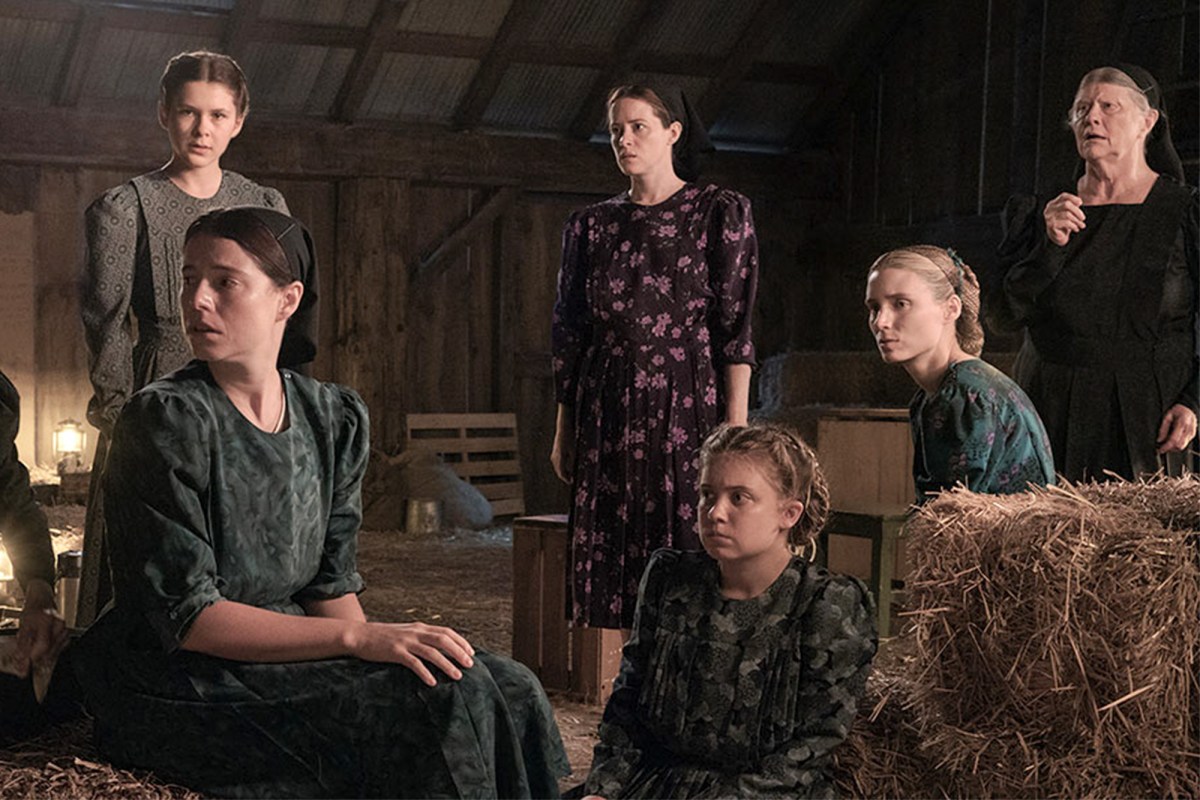Women Talking has become a fascinating film to unpack. Mainly in that while watching it, you realize just how strange it is to see a movie where there is only one male character and he barely speaks. For years, we’ve been thrust into a world of mostly male characters interacting. But Sarah Polley’s Women Talking aims to change that with a hard press situation her characters must wade through.
Based on the novel of the same name by Miriam Toews, the movie follows a group of women in a religious colony. One that has trapped them from the modern world and abused their love and trust, these women are at their wits end on what to do. Leave the only life they’ve ever known to protect their daughters and themselves or stay and raise their sons to be better men. It is through Sarah Polley’s direction and a stellar cast that we’re taken into their lives and struggles.
And the film works because of the performances within it. One of those being Claire Foy. Foy plays Salome Friesen, a woman who is trying to come to terms with what they all must do for themselves and the safety of their daughters. And when I asked Foy what drew her to the project, it was shocking to hear it was because of how rare she knew movies like this were.
“Too many things to number basically,” she said in response to me asking what made her want to be a part of the film. “Dede (Gardner) and Frances (McDormand) were producing it and Sarah (Polley) was directing it. I think Sarah’s an incredibly brave and interesting director. The book, it was beautiful. I thought the real life story of it was, you know, traumatic and horrendous. And the script was just really beautifully done. I knew that it was gonna be something, I didn’t know what. If it would be good or bad, but I knew it would be something really different and unique and nothing I would’ve made ever.”
The appeal of Women Talking
Foy bringing up how it was something unique really struck me because it is. The movie has really only one male character named August Epp (Ben Whishaw) who is willing to help these women come up with a plan and be their pen. And seeing all these women come together and talk with each other, while almost mocking him, was shocking. Mainly in that I don’t know that I’ve seen many movies where the female characters not only out number but seem to out rank the male characters. It was both refreshing and yet upsetting when you were reminded of why they needed August in the first place. (None of the women could write themselves despite a modern setting.)
Which makes Foy’s character arc so devastating. She is one of the women going back and forth on whether or not they should stay (mainly for their sons). And Salome’s journey is a painful one. For Foy, it was about mapping out those moments that led to her break and the flood of emotions she releases when she comes to terms with what she must do.
“I think you have to do a little bit of mapping out just to make sure that you get the beats of the journey, right? I think you have to know,” she said. “There’s a thing that I used to do with scripts, which was like, the point of no return. Basically, at what point has your character gone to a place they can’t come back from? And that happens a lot. And a lot of scripts, it happens quite frequently. And I think with this, it’s especially Salome, her rebound rate’s quite quick. She will go somewhere and then she’ll be like, ‘Nope, that’s my position.’ Go somewhere and then go, ‘no, no, no.’ And, and I think that’s fear. I think she’s afraid of letting go of her rage or letting go of her need for justice and revenge, basically. And I think that that’s all she has to keep her going.”
And it is ultimately her daughter that convinces Salome what she must do. “And I think the admitting that they need to leave is admitting that she needs to be able to let go of it and heal at some point, not immediately, but accept the reality of what’s happened to her and her daughte, and her mother and her sister and her friends and everyone in the community,” Foy went on to say. “So I think that it keeps her going for a long time, but I think ultimately she has to live her life and move on. But I think that that’s the beautiful thing of the story is that some people very quickly come to terms with it and know they have to leave. The point is that all those options have to be on the table and all the different characters are fighting to the bitter end for whatever stance they have. And I think watching someone change is basically drama, right? It’s basically what you watch something for. You’re watching someone change before your eyes and come to terms with something and become a different human being. And I think that’s what is amazing. And I genuinely didn’t really get that until we were shooting those scenes. I didn’t get the revel, like the revelatory concept of, okay, no, I get it. We have to leave.”
It’s time to leave
The decision to leave does not come easy to the women of Women Talking and in speaking with Sheila McCarthy and Judith Ivey about their characters Greta and Agatha, they were open about their own understanding of their desires. “I think that for Greta, the character that I play, very early on, she in her heart wants to leave,” McCarthy said. “She’s listening and she’s very patiently listening, but I think that she, in her heart knows, not that she wants to leave, but that she cannot stay. She has seen the traumatic events that have happened to her, but have also happened to her children, her daughters and her grandchildren, and all the other women in the colony who’ve been affected by these horrendously violent events.”
And for Ivey, Agatha’s journey took a bit longer. “I always thought that because Agatha in the end, says that they should leave, she should begin not knowing that, particularly because my two daughters sort of fight over choice,” she said. “So I, I always tried to keep her open to hearing everybody’s points of view. She was one of the leaders to guide the discussion, the debate so that it takes my daughter’s rage and, want wanting to take revenge for me to say, now you’ve taught me, we have to leave. There’s no choice.”
__________________
Women Talking was released in theaters on December 23, 2022 and is not yet streaming but if it is showing near you, this is a must see!
(image: Michael Gibson/United Artists Releasing)










Published: Jan 12, 2023 10:48 PM UTC